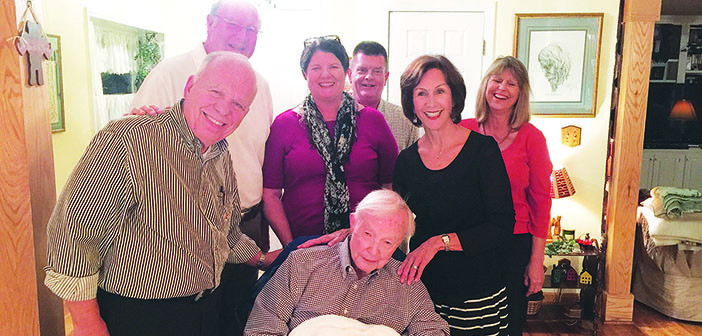By Jeff Keeling
He’s the pastor emeritus of Munsey Memorial United Methodist Church, a man who always strove for ecumenism and equality, and who rose from humble beginnings to be able to say today he has, “fought the good fight, finished the race and kept the faith.”
Late last month, in conjunction with his 99th birthday, Dr. Paul Brown Sr. received a Tennessee Senate proclamation honoring him, “for his faithful service to the Lord and the good people of this state.”
The oldest of Brown’s four children, Dr. Paul Brown Jr., said his father was “surprised and honored” at the recognition.
“I’m happy that the people recognize what all he’s accomplished, and hopefully these things will continue because he believes, like Saint Paul did, that everybody doesn’t do the harvest all the time,” Brown said. “So each thing that you do, you’re planting or you’re supporting.”
By the time Brown Sr. took the pulpit as senior pastor at Munsey, his career as a pastor and teacher was well-established. Already well into middle age, Brown had, with his wife Pauline, raised four children, led church integration efforts in the Holston Conference and followed a path that combined sound, complex teaching with a heart for pastoral care.
He wasn’t done. Brown served six years at Munsey, then continued ministering well into his 70s, holding church services at the Asbury Center downtown. He and Pauline were married 60 years before she died, and today Brown enjoys spending time with his children, 11 grandchildren and 11 great-grandchildren.
Brown’s care for others stemmed from others caring for him, Brown Jr. said. He was born in Northfork, W.V., but when he was 14 Brown’s father, James, died. Brown’s uncle Walter Brown welcomed him, his sister Thelma and their mother to his farm outside Chilhowie, Va. from their home in West Virginia. A bright teenager, Brown worked on the farm, but seemed to have few prospects with the Depression in full swing.
He had a cousin, though, who worked at Milligan College, and it so happened the man responsible for much of the college’s development, Josephus Hopwood, needed a “houseboy” to chop wood and do other household chores for him and his wife Sarah, who were around 90.
The opportunity would change Brown’s life. Hopwood, long retired but still involved with Milligan, was a Christian college educator who founded multiple colleges and helped establish the Mountain Mission School in Grundy, Va. The 18-year-old Brown spent two years, the last of Hopwood’s life, soaking in the philosophies and commitments of a renowned Christian educator who was 18 at the start of the Civil War.
“He says Hopwood was some type of spiritual leader for him,” Brown Jr. said. “He was already planning to go into the ministry, but Hopwood was a definite influence on him.” The Hopwoods died during Brown’s second year at Milligan, though, and he again faced money issues. He ended up finishing his bachelor’s degree at Emory and Henry College in Emory, Va. A master’s degree at Boston College and Ph. D in New Jersey followed, so by the time Brown settled in with the Holston Methodist Conference he was a scholar to be sure. He had also pastored several churches.
As he and Pauline raised Paul Jr., Anne, Miriam and Sam, Brown served in campus ministry, also teaching religion and philosophy at Emory and Henry and at what later became the University of Tennessee-Chattanooga but was then a Methodist college. The Holston Conference encouraged Brown to return to direct church ministry, and he pastored in Lenoir City, Oak Ridge and Maryville before becoming the district superintendent in the Clinton and Oak Ridge districts.
Brown Jr. said his father was very influential in helping bring an African-American bishop into the conference – the first in the U.S., he said – and also in bringing an African-American pastor to Kern Memorial in Oak Ridge – “the first all-white church to have a black minister,” Brown Jr. said. “He just has always felt that, this whole thing of slavery and inequality, he’s always been an advocate for the last and the least.”
As his children began their careers Brown was given the esteemed pastorate of Munsey, where he served six years. He continued shaking things up a bit, Brown Jr. said, reaching across lines while serving as president of the Johnson City Ministerial Association to the degree that he and the priest at St. Mary’s Catholic Church even exchanged pulpits.
What Brown Jr. called his father’s strong theology – he preached without notes and delved deeply into scripture – was balanced by a strong shepherding approach, he said.
“It wasn’t the case that he would say, ‘in the Good Book it says…’ you know he would say ‘In Philippians 2:2, this is what Saint Paul was dealing with here and this is how we can apply that to our lives.’ So we got a very strong theology as well as this passion for others, and I’m sure that’s affected me going into medicine, my brother going into medicine. My sister Anne is a social worker. My sister Miriam is a teacher. So we’re all in professional care of others.”
For all his preaching skills and education, Brown is probably known more today for his dedication to the flock, Brown Jr. said.
“The people here in Johnson City will tell you that they knew him most not because of his sermons, but because of his pastoral activities. He was in the hospitals; he was in the homes. My mother was able to go with him and so they were able to visit a lot of homes all day long. They didn’t have to worry about if the husband was there and all that kind of stuff. So by the time they got here (to Johnson City) and we were all grown, it was a combined ministry.
“I’m happy that the people recognize what all he’s accomplished and hopefully these things he helped get started will continue.”





